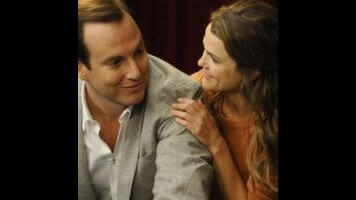It's sad, but honestly not all that surprising. I never quite got the sense that Running Wilde had found its groove. It was a show that introduced a lot of moving parts all at once and hoped they'd all come together in the end. The claustrophobia was fine for a little while, but it never had anything distinct and solid enough to hang its hat on. It perpetually felt like a show that wanted nothing more than to be "on the air" and "funny" but hadn't gotten much further.
I certainly saw promise. The first few episodes really packed in the jokes and went to great lengths to give Steve Wilde outrageous situations to play with. Then when it came time for Steve to inhabit similar situations in future episodes, he dragged out the same shtick he'd used before—a propensity to make blind promises—then fumble his way into realizing those promises. There was no forward momentum, no development of the ostensibly central relationship between Steve and Emmy, not even any development of the playfully antagonistic Steve and Fa'ad relationship. Potential and incredible talent felt squandered.
It wasn't all a waste, though. Maybe because I know the end is near, I saw lessons in "Mental Flaws" that speak to larger problems in modern television. I thought it'd be fun to take on one or two each week for these remaining episodes, or until I lose interest, or whichever comes first. (Lose interest.) First up …
Running Wilde Lesson #1: Familiarity means something different to everybody.
Mitch Hurwitz made no secret of the fact that he wanted Running Wilde to be a mainstream hit. Well, enough of a hit, I guess, that he could make some money and have the financial flexibility to work on the Arrested Development movie. By his own account, he made major concessions that the network wanted him to make, all in the name of longevity. But the execution was flawed. Steve Wilde isn't the everyman who helms ratings gangbusters like Mike & Molly, nor is he an affable middle-American schmuck like the stars of Greg Garcia's My Name Is Earl or Raising Hope, Running Wilde's de facto competition. He's a guy too quirky for the mainstream, too privileged to be relatable by default. Hurwitz's notion of the everyman truly is a watered-down Gob.
Tonight, Steve is about as typically Steve as he's been all season. He wants to take Emmy to a fancy party (no, another one), and is so excited that he Photoshops her face for a magazine spread, just so she looks perfect. Emmy is offended because she doesn't want Steve to be so concerned with looks, but secretly, she wants to go to the party. Thus begins an elaborate back-and-forth where Emmy attempts to teach Steve the value of looking beyond the surface, and Steve "learns" only so far as he learns to listen to what Migo tells him to say and recite it word-for-word. Steve makes plenty of comical asides ("Robin Williams is at our table, and that guy won't stop until everyone's pretending to laugh") and, in the case of a funny-turned-labored joke about dental school, telegraphs those asides plenty of times after the fact. And when the ruse gets too elaborate—involving Fa'ad in a ridiculous blonde wig and Jonathan from 30 Rock—the overwhelming lesson we glean is that Steve 1.) didn't learn anything, and 2.) is a spoiled rich kid with daddy issues. (And he likes givin' it to people in the butt—the thermometer, that is.)
Bottom line: This guy's not "familiar" in the traditional sense. And that's fine. But Steve Wilde bothers me because I find him more boring than anything, and that boringness isn't even serving Mitch Hurwitz a greater good. I mean, I find elements of Modern Family boring, but they're infinitely tolerable so long as the show can sneak in fantastic moments of screwball comedy into a megahit TV sitcom. So Steve's basically Gob, and Emmy has yet to show any semblance of personality, other than shades of frustration with Steve. Puddle doesn't really do anything (other than play with her "thing"), Mr. Lunt truly is unnecessary, and Migo's creepy side—taking in Steve's battered former maid—is not pronounced enough yet to balance out his flat, advice-giving side.
On Running Wilde, familiarity is often times a crutch. And to the shock of no one, the most surprising parts of "Mental Flaws" were by far the funniest. Fa'ad continues to delight me every week. He's a chaotic element that has yet to exist in the Hurwitz universe: a talented bozo who does things just because he thinks they might be fun. Every line of his is said in beautiful deadpan, and when he entered as the oddly country-tinged doctor, I lost my shit—mostly because of the way he relentlessly stuck to his weirdness. And, of course, the sheer randomness of Maulik Pancholy was enough to justify his decision to appear on the show.
The majority of Running Wilde exists in this weird middle ground between familiarity and the unexpected. In his attempt to please both critics and a mainstream audience, Hurwitz has tried the patience of both.
Stray observations:
- A small moment that wasn't telegraphed: Migo asking Steve "What charity?" then covering up the magazine just as Steve leaned in to cheat.
- "I never thought this would be the way I'd be tearing up your sheets."
- Apple = Arrested Development reference? I don't even know anymore.
- Best thing about Fa'ad ever said: "How does he even get in here?"
- I cannot state enough the genius of Peter Serafinowicz and how glad I am he has a home in the States—even though that home's temporary. Please, America, find something else for him to do ASAP.


 Keep scrolling for more great stories from A.V. Club.
Keep scrolling for more great stories from A.V. Club.